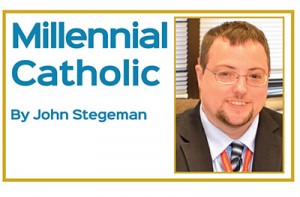Why aren’t more millennials in the pews? Let’s ask them
 When you ask why millennials aren’t attending church on a regular basis, you get a variety of answers.
When you ask why millennials aren’t attending church on a regular basis, you get a variety of answers.
Because of the music, or the sermons, or because we have the attention span of a gnat, some say. Because an hour for God is just too much, after all we’ve gotta check Instagram and Facebook, say others.
Well, why speculate? It is clear there are more gray hairs than black or brown in many parishes each Sunday, but millennials are sprinkled in among them. To find out what’s keeping most of the “non-church millennials away,” we decided to ask them.
Before we get to that, a brief introduction is in order for this new column.
Most of you reading this won’t be millennials, I know. But I’m fascinated by learning about other generations and I find the more I learn, the more I understand. Hopefully, in this column we’re calling Millennial Catholic, I’ll be able to help you understand a bit about millennial Catholics, and maybe I’ll learn more about my own generation too. Unlike our religions, which we must choose as adults, providence binds us to a generation. I’m not an expert on religion or generational studies, but I am a Millennial, and I’m a Catholic.
Back to the purpose of this column, I asked my millennial-aged Facebook friends and followers a question. Among those that believe in God and the Bible, I asked if they do not go to church, why not?
The responses were honest, heart-wrenching, and with some exceptions, very much what most of you would expect to hear. Speaking from anecdotal research on a statistically insignificant sample size, the non-church millennials say they skip Mass or church services primarily because being a part of a physical faith community with worship services wasn’t a priority for their version of faith.
While the teachings of our Catholic faith are immutable and true for all generations, it is no secret that those truths are being rejected by scores of young people. Many of the people building families today in their 20s and 30s are like the ground in the parable of the sower (Mark 5:1-20). The Church is the farmer, still sowing the word, but at best a significant number of my generation receive only part of the message. The non-church millennials believe in God and in doing good. They believe in parts of the Bible. They feel the yearning and the call of truth. They are not a generation without faith, just one without a church — so far.
So what did these folks have to say? More people responded than are quoted below, but these selected answers cover most of the bases. Quotes have been edited for brevity and clarity.
One man, at the upper age of the millennial bracket, doesn’t attend Mass on a regular basis but considers himself a practicing Catholic. He answered that he believes in God, the bible and the Apostle’s Creed, but quickly added that, in his view, the Bible has been reinterpreted by man too many times. His position concerning a “personal relationship” with God was repeated by more than half of those who responded.
“I don’t go to church regularly because I believe more in a personal relationship with God,” said the married father of one. “I speak to God almost every day. I pray. I never pray for things; I only pray for understanding, peace, and guidance. I think we take the church with us, and community is nice, but not a requirement to me.”
An engaged woman in her 20s echoed the belief that cultivating a personal relationship with God can be done without going to any church.
“Really, for me, it’s not that I disagree with any part of my religion or anything the church teaches, it’s just that I’ve never found a good church that I enjoy going to. Simple as that,” she said. “And I don’t believe that you HAVE to go to church to have a relationship with God.”
Others said they have issues with the message being taught at some churches.
A married mother of two said, “My social and political views do not mesh with the Catholic Church. I believe in teaching my children to love everyone and allowing them to love whomever they want. I would be a hypocrite if I raised my girls to follow the Catholic Church’s viewpoints when they are not what I believe is right. … I am not writing off the Catholic Church completely, but we have a jaded relationship right now…”
Another woman, a married mother of one, added the following.
“The main reasons I don’t go to church (as small or silly as it seems to some) is gay bashing and hypocrisy. I’m tired of it. I don’t need a pastor or priest to tell me to love thy neighbor — unless they’re gay. … I believe in God, I love and trust him and I pray to him… In my heart I want to find a church that doesn’t give me that nauseating feeling after attending, but no luck so far.”
Even among those who believe wholly in the teachings of the church, the difficulty of daily life can be enough of a struggle to keep them away some Sundays.
“I consider myself Catholic and rarely go to church. My kids are all baptized… They go to PSR and we talk about God and Catholicism at home,” added another mother. “I always intend to go more often. I do consider it a sin when I don’t go, and definitely when I don’t take the kids, and I’ve confessed it a few times. The absolute honest answers as to why I don’t go: laziness, it’s a huge struggle because I have two REALLY squirmy boys and have to take them to church alone. My husband is usually at work and when he isn’t he doesn’t go.”
These five responses can’t begin to address the full spectrum of why, according to an ABC News poll, just 28 percent of 18-30 year old Americans attend a church once a week, but they’re a start.
A well-catechized Catholic seeking to respond to those quoted above could easily offer quick retorts to each point. They might point out that while a personal relationship with God is crucial, “The Church in this world is the sacrament of salvation, the sign and the instrument of the communion of God and men.” (Catechism of the Catholic Church 780). They might note that church teaching calls for those with same-sex attraction to “be accepted with respect, compassion, and sensitivity. Every sign of unjust discrimination in their regard should be avoided.” (CCC 2358). They might mention no matter how we’re feeling on a Sunday morning, “…Sunday is the day on which the paschal mystery is celebrated in light of the apostolic tradition and is to be observed as the foremost holy day of obligation in the universal Church.” (CCC 2177)
Those of us blessed with the gift of faith and some information about the church could respond by spouting our knowledge of the Catechism. But the real way to knock down their walls and bring them home to Christ won’t be found in an textbook-based reply. It will happen, if it happens, with authenticity, love and encouragement.
Why aren’t more millennials in the pews? Because they don’t think church is an attractive place to be. We know it is, but if we don’t show that, how can we expect them to see it? They don’t know that the belonging, the love, the relationship with God that they seek is already there in the Eucharist waiting for them.
We can (and eventually we must) tell them the bread and wine, through transubstantiation, become the Real Presence of Christ’s Body and Blood. We can (and again must) tell them about apostolic succession and Christ’s establishment of the papacy and the inerrancy of scripture etc. But before we can tell them anything, we must remove the beam from our own eyes and live the authentic attractive faith that Christ handed on to us.
That duty falls on all of us — Millennials, Gen X, Boomers, Silents, Greatest Generation, etc.
When you come across the non-church millennial who questions what place the church has in their life, don’t scoff. In a 2014 interview with a Flemish TV station, Pope Francis said to encourage those unchurched types who are searching for God, as many of those quoted above appear to be.
“When a person searches for his or herself, they find God,” the pope said. “Maybe, they don’t succeed in finding him but they are going along the path of honesty, searching for the truth, for a road of goodness and a road of beauty… they’re on the right road and it’s certain they’ll find God! Sooner or later, they will find him.”
The key then isn’t having a quick answer to all the questions, but to help anyone of any generation who is searching to stay on that path.
Have an idea for a Millennial Catholic column topic? Email John Stegeman.













